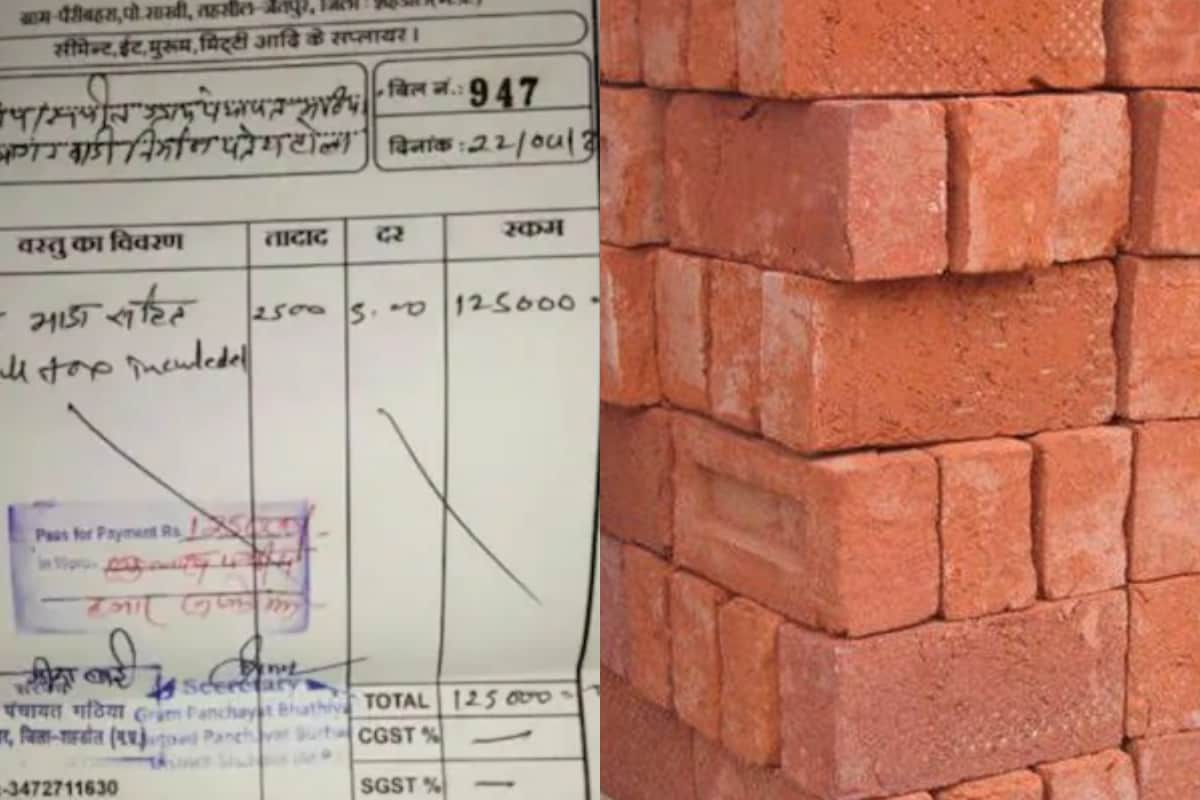Billing Bricks at Rs. 1.25 lakh in Madhya Pradesh's Shahdol Stirring Suspicions of Corruption
National NationalPosted by AI on 2025-08-30 16:07:30 | Last Updated by AI on 2025-08-31 00:46:58
Share: Facebook | Twitter | Whatsapp | Linkedin Visits: 0

A bill from Shahdol, Madhya Pradesh, asking for Rs. 1.25 lakh (approximately $1666.67) for 2500 bricks is sparking suspicions of corruption and fraudulent practices in the area's gram panchayats, prompting an official investigation. The bill, which has been shared widely on social media, highlights a very high cost per brick, triggering outrage among locals and netizens, who argue that the high price indicates major irregularities in the rural bodies' operations.
This alarming incident has brought the spotlight on the issue of corruption in gram panchayats in India. Given the significant media attention, the district administration has taken swift action and ordered a probe into the matter.
Madhya Pradesh is no stranger to such controversies, with several past incidents of alleged corruption and questionable financial transactions in rural bodies. This bill and the ensuing investigation will hopefully clean out any such practices and restore honest, sincere governance in the region.
The excessive amounts involved in the brick billing saga highlight the necessity for stronger oversight and accountability in India's gram panchayats. A collective effort from the administration, locals, and vigilant citizens will help pave the way for a more transparent and honest governance system free from corruption.
This case serves as yet another reminder of the need for such investigations into potentially fraudulent practices, as they ensure accountability and help restore public trust in the institutions managing their funds.
Conclusion:
Corruption and fraudulent practices in gram panchayats and other public bodies must be investigated and stopped. The high billing costs for bricks in Shahdol, Madhya Pradesh, have captured the public's attention and prompted an investigation by the district administration.
By addressing these issues, we can work towards ensuring transparent and honest governance in India's rural communities. All investigations like this one shine a light on questionable practices and are a step towards restoring public trust in the system.
Search
Categories
- Sports
- Business
- History
- Politics
- International
- Science & Technology
- Social Issues
- Disaster Management
- Current Affairs
- Education
- Startup Business
- Startup News
- Awards
- Community Services
- Fundraising Events
- Volunteer Services
- Health Initiatives
- Innovations and Initiatives
- In News
- Banners
- Awards
- Partners
- Products
- Press Releases
- News
- Fast Check
- South
- సినిమా
- Gallery
- Sunday Chronicle
- Hyderabad Chronicle
- లైఫ్ స్టైల్
- National
- క్రైం
- ట్రెండింగ్
- జాబ్స్
- అంతర్జాతీయo
- బిజినెస్
- రాజకీయం
- బిజినెస్
- సంపాదకీయం
- నవ్య
- చిత్ర జ్యోతి
- క్రీడలు
- జాతీయం
- తెలంగాణ
- తాజా వార్తలు
- మన పార్టీ
- మన నాయకత్వం
- మన విజయాలు
- డౌన్లోడ్స్
- మీడియా వనరులు
- కార్యకర్తలు
- North East Skill Center News
- Government Schemes
- Entrepreneurship Support
- Employment Opportunities
- Skill Training Programs
- Departments
- Investments
- Initiatives
- Resources
- Telangana IT Parks
- Events & Jobs
- Press Releases
- News
- Airport News
- Newtons Laws of Motion
- Karbonn in Business
- Investments in Karbonn
- Company quarterly sales
- Markets
- Auto News
- Industry
- Money
- Advertisements
- Stock target
- Company Updates
- Stock Market
- Company Sales
- Staffing and HR
- Constituency Assembly
- General News
- Srikalahasti Temple
- Bojjala Sudhir Reddy
- Technology & Innovation
- Sports
- Business
- Products
- Industries
- Services & Trainings
- Tools & Resources
- Technology Integration
- Drug Seizures & Arrests
- Telangana Narcotics
- Law & Enforcement
- Rehabilitation
- Nationwide Drug Policing
- Nigeria Seizures
- Global Operations
- Drug Awareness
- Drug Enforcement Tech
- NCB Drug Seizures
- Judicial Crackdown
- India's Surveillance Tools
- Cross-Border Links
- Women Safety
- Cyber Crimes
- Drug Abuse
- Traffic & Road Safety
- Community Connect
- Public Safety Alerts
- Citizen Assistance
- Nellore City News
- Politics & Administration
- Events & Festivals
- Agriculture & Rural
- Business & Economy
- Health & Wellness
Recent News
- Hindu Marriage Valid Even Without Registration Certificate, Ruled By Allahabad High Court
- Satwik-Chirag's Journey to Silver at World Championships
- How Safe Are Our Cities?
- Here is a sample news article on the given title, written in 2 to 4 paragraphs as required:
- India's Gangotri Glacier Losing Snow, Affecting Local Ecosystem
- WhatsApp Fraud, Malicious App Results in Rs 7.5 Lakh Loss; Hyderabad Police Issue Warning
- Elon Musk's Colossal Ambition: The Starship That Could Reignite Space Exploration
- Nellore's Stree Shakti Rally Hails CM's 'Super Six' Schemes